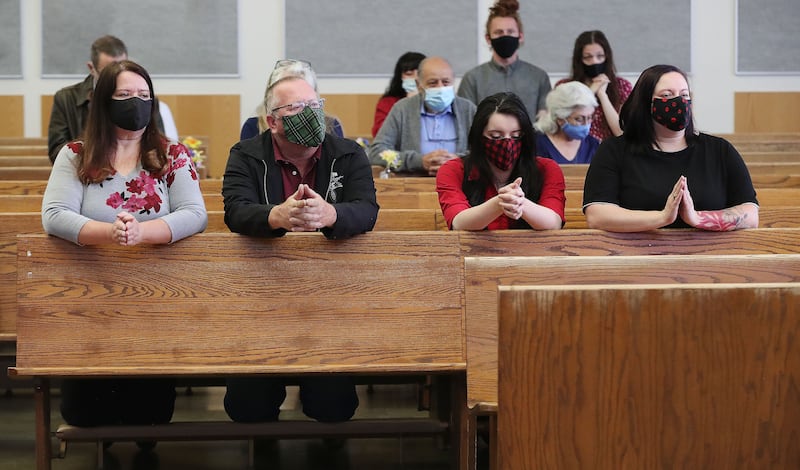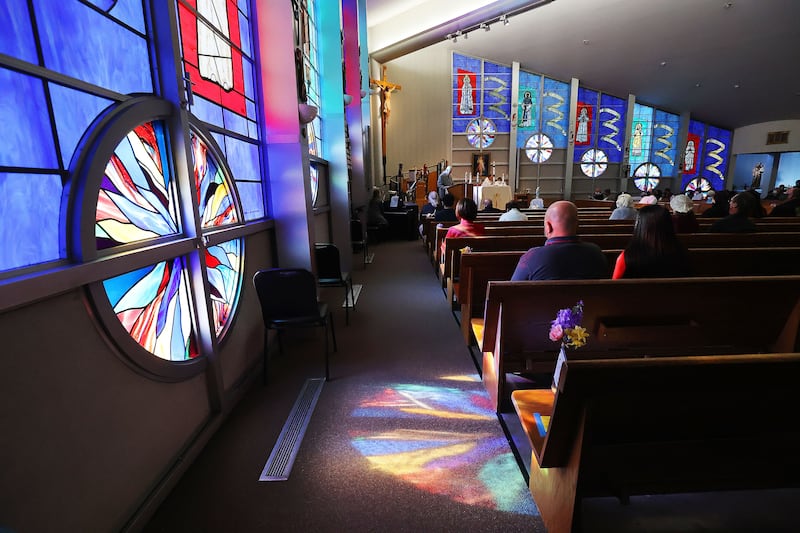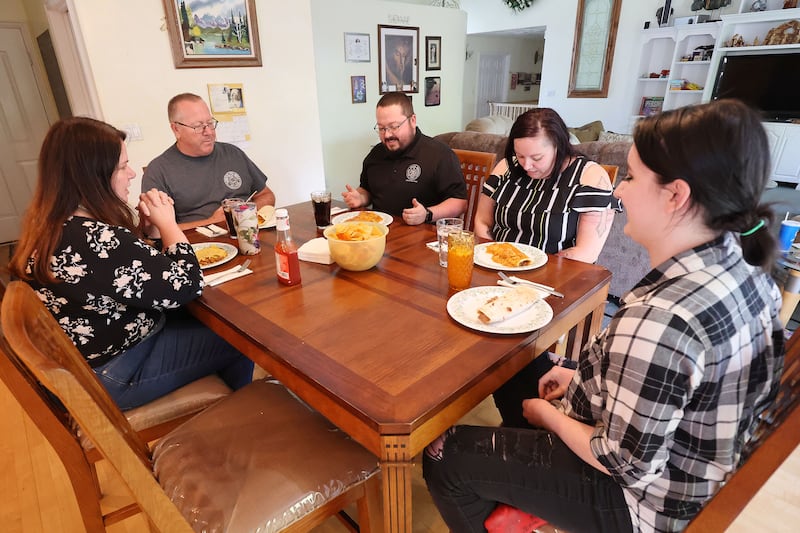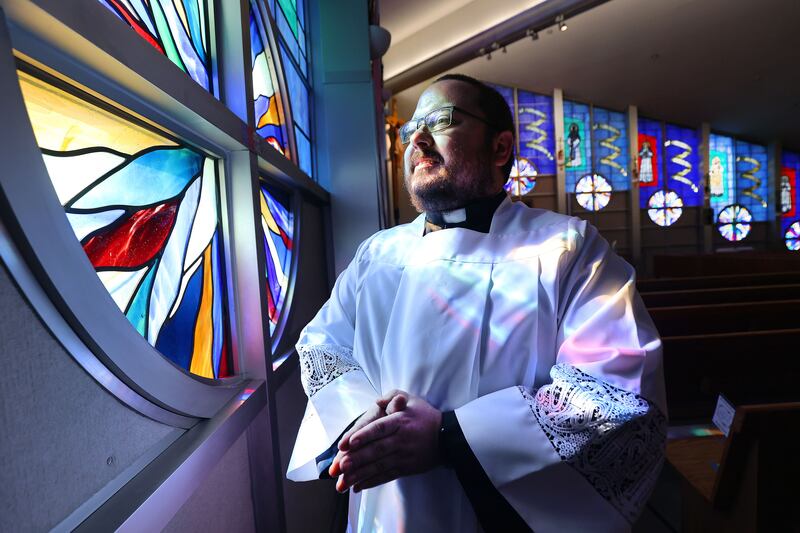Although Scott Shumway is extremely proud of his two children’s commitment to religion, he sometimes bristles when people congratulate him on his son’s decision to study to become a Catholic priest.
Shumway, who lives in Murray, Utah, doesn’t think he can claim his son’s success, because, “All I did was tell him that, whatever he became in life, ‘If you are happy and can support yourself, I’m happy. If you want to dig ditches, if you want to be a car salesman or a doctor, or if you want to be a priest — as long as it’s legal and moral, that’s OK.’”
Ironically, perhaps, Shumway’s low-key, no-pressure approach to religion might be exactly what led his son to the priesthood.
According to a new book, the best way to pass faith down to your children is to stay relaxed while modeling joyful worship and genuine belief.
“Parents have to really believe it. The kids can kind of tell how much of this is fake,” said Amy Adamczyk, co-author of “Handing Down the Faith: How Parents Pass Their Religion on to the Next Generation.”
Shumway agrees that parents should model the religious behavior they want their children to emulate, but adds that it’s important not to put too much pressure on kids.
“We always made the church the center of our family. We never pushed them to go to church. When they were young we bribed them,” he said with a laugh. “If you go to church and behave, you get donuts afterwards.”
“We just made church as important a part of our life as Sunday dinner,” Shumway said.

Weaving faith into daily life
Adamcyzk and her co-author, Christian Smith, found that parents have more of an impact on their children’s religiosity than congregations do, which is why families have to be careful with how they talk about faith.
It’s important to be open to children’s questions and let their curiosity guide discussions about religion and God, said Adamczyk, a sociology professor at the John Jay College of Criminal Justice at the City University of New York.
“Two-way conversations” are the key, she said.
In addition to going to mass together, Shumway, his wife and their children often had philosophical conversations about religion and God at home, he recalls. These day-to-day discussions weren’t treated as a big deal; they were just a normal part of the family’s interactions.
Similarly, the Rev. Traci Smith, pastor of Elmhurst Presbyterian Church and a mother of three, weaves small acts of devotion into the fabric of her family’s daily life.
One of her children’s favorite activities, she said, is their Saturday gratitude practice during which the kids say what they’re thankful for and they write it down on a large scroll of paper. She does prayers that involve stretching and moving the body, and she recommends things like pet funerals and different creative ways to do faith practices “at home with little snaps of time,” she said.
In her professional work, she tries to help other parents learn faith practices that they can do with their children.
“If you want your kids to learn how to play baseball, you play with them,” said the Rev. Smith, who is the author of the Faithful Families series. Raising faithful children, she explains, works the same way.
The Rev. Smith adds that there’s a “toxic way” of passing religion down to one’s children — a “brainwashing, disrespectful, fear-based” approach.
“That’s not totally about the technique but also about the theology,” she said, “and it can be damaging to children. It ultimately drives people away from the faith completely.”
Adamczyk agrees that using an authoritative — rather than authoritarian — parenting style is most effective in passing on faith to the next generation.
An authoritative parenting style is one that merges “strictness with warmth and love,” she said.
“The kids feel that there are boundaries and feel that there are things they need to do but they know if they don’t do them (their parents) still love them,” said Adamczyk. “These kids like their parents a lot and that leads them to want them to be like their parents.”
In addition to being intentional about how they talk with their kids, parents should be mindful of how they behave, she added, noting that it’s not enough to say that faith is important, parents have to live that out.
Adamczyk suggests that parents who read the Bible at home do so in a place where their children can see them. It’s not about telling the kids. It’s about “showing them that every Saturday or Sunday they read (scriptures) for an hour,” she said.

Differences among religious groups
“Handing Down the Faith” features findings from over 200 interviews that the authors conducted across the country with Americans from all walks of religious life. The study was unique, Adamczyk notes, because while much research has focused on young people themselves, less has been done about parents.
Although participants came from many different backgrounds, they were remarkably similar in that “70% ... were of the same religion as their parents,” she adds.
“Everyone thought about what their parents did to them and then they thought about how they were going to raise their children,” she said.
Though many parenting habits are universal, the research uncovered some differences between members of different faith groups.
Jewish families, Adamczyk notes, seem to be particularly good at having relaxed, open-ended dialogues about the divine. This may help explain why Jewish Americans have a high rate of retention — 75% of Americans raised Jewish remain Jewish as adults, according to Pew Research Center.
Jews, as well as members of other minority religious groups, also seemed to be more affected by the religious practices of their grandparents than other Americans, the new book showed.
In the case of Black parents, Adamczyk notes, their religious community plays a key role in encouraging their children to embrace faith. Black people who live in proximity to their hometowns often “drive back to the churches they grew up in” and rely on other congregants to help model religious practices, she said.
As the experience of Black Americans suggests, proximity to your faith community matters when you’re trying to pass on your religion. Families from The Church of Jesus Christ of Latter-day Saints also expressed this during interviews, Adamczyk said.
“They didn’t want their kids to feel weird. So they would try to find (nearby) congregations and communities they could point to and say, ‘See, you’re not the only teenager who’s Mormon!’” Adamczyk said.
She added, “Some of the Mormon parents I talked to (on the East Coast) said, ‘How do I find a girl for my son? My son wants to date, he’s of dating age and we don’t have a lot of girls at our church that are of age.’”

Adamczyk recalls one Latter-day Saint father suggesting that his children look to the local conservative Protestant churches for a sense of community.
Similarly, Shumway says that he encouraged his children to seek out connections with members of other faiths and then opened his home to these friends.
“We have really good friends who are very devout Catholics and devout Mormons,” he said. “We don’t look down or up to anyone depending on what religion they are. We have had friends who are Jewish and friends that are Muslim — the more you can teach your kids that everyone is the same on the outside, the better.”
That’s another faith-related lesson Shumway shared with his children: “It doesn’t matter if and where somebody prays, all that matters is that they treat you right.”



